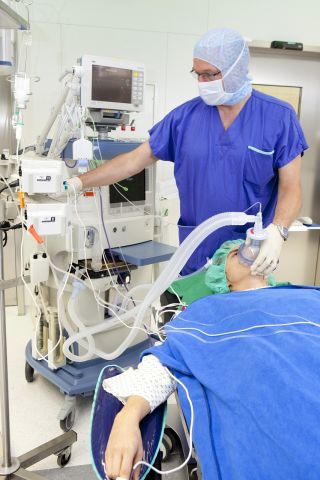Mild Cognitive Impairment
Anesthesia, Surgical Procedures, and Cognitive Dysfunction
On the need for collaborative care in medicine and clinical neuropsychology
Updated May 15, 2024 Reviewed by Davia Sills
Key points
- Anesthesia was developed to discompose brain and cognitive dysfunction.
- Studies show a significant relationship between anesthesia and memory loss.
- Postoperative cognitive dysfunction (POCD) can occur and involves short- or long-term memory loss.

A recent neuropsychological evaluation diagnosis impugned several controversial theories about anesthesia and cognitive decline. As a medicinal therapy to relieve pain and brain dysfunction, anesthesia has been relevant since as early as 4000 BC with its use for cultural, military, and religious purposes (Lutnick et al., 2022); however, Drs. William T. G. Morton and John Collins were the first recorded in modern history to use diethyl ether to mitigate pain during surgical procedures (Cohen, 2021). As its use emerged, anesthesiology became a medical subdiscipline known as “modern medicine” in the 20th century.
To provide some context to the ambiguous relationship between anesthesia and memory loss, I discuss the case study of a young patient who self-referred for a neuropsychological evaluation based on significant attention and memory challenges more related to symptoms indicative of the neurodevelopmental disorder attention-deficit/hyperactivity disorder (ADHD). However, after obtaining biopsychosocial data from the patient, the concern was about the possibility of a neurocognitive disorder due to chronic medical conditions and multiple surgical procedures involving general anesthesia.
Results from the evaluation showed that the patient had significant deficiencies in working memory, processing speed, immediate memory, language, and attention, as well as delayed memory, which are part of essential cognitive domain criteria in neurocognitive disorders. In addition, multiple medical and neuropsychiatric conditions played a role in the patient’s cognitive decline, as results showed long-term moderate and severe neuropsychopathologies. Because there were no previous evaluations, this neuropsychological evaluation established the patient’s baseline for cognitive status.

What are the risks and implications of anesthesia and cognitive dysfunction?
Before medical concerns, the patient had a long-term career and thrived based on their performance and ability to complete complex tasks. However, once medical issues arose, the severity led to multiple surgical procedures, chronic pain, and complications that impeded their personal, social, and professional life. The patient noticed significant memory decline following procedures, impacting their work and ability to complete daily responsibilities. Idiopathic memory dysfunction worsened, and an unknown neurological connection became prominent; therefore, the patient requested a neuropsychological evaluation for further diagnostic clarification.
Postoperative cognitive dysfunction (POCD) is a condition following surgical procedures in which patients can experience short- or long-term memory loss. The syndrome is a spectrum of cognitive impairment concerns affecting memory and higher-level cognitive competencies (i.e., executive function) (Vacas et al., 2021). The long-term implications of POCD are cognitive decline and learning challenges; however, research suggests a higher likelihood of cognitive dysfunction for older populations and individuals with multiple surgical procedures involving anesthesia.
The patient could have experienced POCD because of multiple surgical procedures over a short period; also, exacerbated chronic pain and neuropsychiatric conditions due to medical illness could have discomposed their memory performance. POCD affects the six cognitive domains (e.g., complex attention, executive function, learning and memory, language, perceptual-motor, and social cognition) that are determinants in neurocognitive disorders (American Psychiatric Association, 2013), and neurocognitive implications are highly likely if memory challenges do not improve. Long-term POCD can lead to mild cognitive impairment (MCI), a neurocognitive condition generally found in older populations and associated with dementia.

Through a Cox regression analysis study, Li et al. (2023) reported that older adults who received general anesthesia for surgery were at a higher risk for MCI based on their performance on the Montreal Cognitive Assessment (a screener for MCI in older adults). Also, it has been reported that older adults, 65 and over, represent nearly 35 percent of the population requiring surgical procedures using anesthesia (Vacas et al., 2021). Such results imply that the older the individual is, the more at risk they are for MCI when exposed to general anesthesia.
Further, researchers obtained data from the Mayo Clinic using a longitudinal study of “prevalence, incidence, and risk factors for MCI” due to general anesthesia (Devick et al., 2021, p. 27). Approximately 1,950 older patients with an MCI participated in the study, and after nearly seven years of research, 172 were diagnosed with dementia, 270 died, and nearly 600 underwent anesthesia for various medical procedures (Devick et al., 2021). Results indicated that anesthesia patients experienced greater cognitive dysfunction (Devick et al., 2021).
It should be considered that this form of MCI is not necessarily associated with dementia. Research shows that not all MCI cases are on the spectrum for dementia. In fact, some MCI cases are short-term challenges and have a positive prognosis based on improvement within a few months to up to 12 months of cognitive dysfunction. In this case study, the patient, in their early 30s, presented cognitive decline features that would be common in older adults (i.e., 65 and older) or those who present MCI due to dementia. However, to my knowledge, there is no familial history of dementia, and the patient was relatively “brain healthy” before medical diagnoses and surgical procedures. Therefore, the patient’s condition opens discussions as to whether age should be the focus for MCI rather than other factors that could cause cognitive decline.
Understanding the complexity of anesthesia and its effects on cognition is important, and providing evidence that supports a clinical and statistical relationship is paramount, as more studies support a linkage between the former and a high risk for MCI. However, other experts believe there is no significant association between the two, suggesting cognitive dysfunction and delirium result directly from anesthetic agents, a short-term experience in surgery (Mayo Clinic, 2024; Belrose & Noppens, 2019; Sprung et al., 2017; Sprung et al., 2016). This negates the causative effects of cognitive changes relative to long-term cognitive decline.
Nonetheless, abundant evidence supports the relationship between anesthesia and memory loss (Li et al., 2023; Devick et al., 2021; Chen et al., 2014; Lloyd et al., 2012). The severity and frequency of exposure to anesthesia could lead to mild cognitive impairment or dementia (Sun et al., 2022; Chen et al., 2014; Lloyd et al., 2012).
Collaborative care
In this scenario, the patient was given an unspecified neurocognitive disorder diagnosis, as one criterion for a mild neurocognitive disorder was not met based on needing access to evidence of medical records indicating pathophysiological symptoms and neurological implications. However, collaborative efforts allowed providers to discuss the patient’s evaluative results, medical records, and medicinal management to meet the criteria and consider a diagnosis change. Nonetheless, learning from this experience, collaboration between medical providers and specialists provides a clearer snapshot of the patient’s medical history for appropriate diagnosis.
The Collaborative Care Model (CCM) is a paradigm for “treating behavioral health conditions in primary care through integrating care managers and psychiatric consultants” (Reist et al., 2022). Overall, provider team effort allows all experts to monitor a patient’s medical and psychiatric status and healthcare delivery. According to the American Psychiatric Association (2024), CCM strongly supports and provides the most evidentiary-based data on integrative medicine and behavioral health care.
Due to the neuropsychological evaluation results, additional concerns are raised about how collaboration can improve the accuracy of neurocognitive diagnoses. Collaborative care can decrease the probability of medical and neuropsychological errors and miscommunication or misinterpretation between providers. In addition, it could mitigate patient costs and increase the likelihood of insurance coverage. Therefore, such efforts improve the quality of care and provide accurate treatment planning options and integrative care.
References
American Psychiatric Association. (2013). Diagnostic and statistical manual of mental disorders. 5th edition.
American Psychiatric Association. (2024). Learn about the collaborative care model. https://www.psychiatry.org/psychiatrists/practice/professional-interests/integrated-care/learn
Belrose, J. C. & Noppens, R. R. (2019). Anesthesiology and cognitive impairment: A narrative review of current clinical literature. BMC Anesthesiology, 19, 241. https://doi.org/10.1186/s12871-019-0903-7
Chen, P-L., Yang, C-W., Tseng, Y-K., Sun, W-Z., Wang, J-L., Wang, S-J., Oyang, Y-J., & Fuh, J-L. (2014). Risk of dementia after anaesthesia and surgery. The British Journal of Psychiatry, 204(3), 188-193. https://doi.org/10.1192%2Fbjp.bp.112.119610
Cohen, E. (2021). Comprehensive thoracic anesthesia: BMA medical book award for anesthesia, critical care, and emergency medicine. Elsevier. https://doi.org/10.1016/C2019-0-00086-6
Devick, K. L., Sprung, J., Mielke, M., Petersen, R. C., & Schulte, P. J. (2021). Association between surgery with anesthesia and cognitive decline in older adults: Analysis using shared parameters models for informative dropout. Journal of Clinical and Translational Science, 5(1), 27. https://doi.org/10.1017%2Fcts.2020.519
Li, W., Jiang, J., Zhang, S., Yue, L., & Xiao, S. (2023). Prospective association of general anesthesia with risk of cognitive decline in a Chinese elderly community population. Scientific Reports, 13, 13458. https://doi.org/10.1038/s41598-023-39300-5
Lloyd, D. G., Daqing, M., & Paola, V. M. (2012). Cognitive decline after anaesthesia and critical care. BJA Education, 12(3), 105-109. https://doi.org/10.1093/bjaceaccp/mks004
Lutnick, E., Pranikoff, K., & Waisanen, K. (2022). A cut above the rest: The historic perspectives of circumcision and anesthesia. International Journal of Urologic History, 2(1). http://dx.doi.org/10.53101/IJUH.2.1.752201
Mayo Clinic. (2024). Mayo Clinic proceedings, 99(5), pp. 685-854. https://www.mayoclinicproceedings.org/current
Reist, C., Petiwala, I., Latimer, J., Raffaelli, S. B., Chiang, M., Eisenberg, D., & Campbell, S. (2022). Collaborative mental health care: A narrative review. Medicine, 101(52), 325-354. https://doi.org/10.1097%2FMD.0000000000032554
Sprung, J., Roberts, R. O., Knopman, D. S., Price, L. L., Schulz, H. P., Tatsuyama, C. L., Weingarten, T. N., Schroeder, D. R., Hanson, A. C., Petersen, R. C., & Warner, D. O. (2017). Mild Cognitive Impairment and exposure to general anesthesia for surgeries and procedures: A population-based study case control study. Anesth Anal, 124(4), 1277-1290. https://doi.org/10.1213%2FANE.0000000000001725
Sprung, J., Roberts, R. O., Knopman, D. S., Olive, D. M., Gappa, J. L., Sifuentes, V. L., Behrend, T. L., Farmer, J. D., Weingarten, T. N., Hanson, A. C., Schroeder, D. R., Petersen, R. C., & Warner, D. O. (2016). Association of Mild Cognitive Impairment with Exposure to general anesthesia for surgical and nonsurgical procedures: A population-based study. Mayo Clinic, 91(2), 208-217. https://doi.org/10.1016%2Fj.mayocp.2015.10.023
Sun, M., Chen, W-M., Wu, S-Y., & Zhang, J. (2022). Dementia risk after major elective surgery based on the route of anaesthesia: A propensity score-matched population-based cohort study. LANCET, 55(101727). https://doi.org/10.1016/j.eclinm.2022.101727
Vacas, S., Cole, D. J., & Cannesson, M. (2021). Cognitive decline associated with anesthesia an surgery in older patients. JAMA Network, 32(9), 863-864. https://doi.org/10.1001/jama.2021.4773




